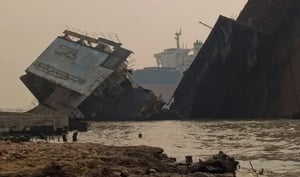
Bangladesh decides to make IHM mandatory for shipbreakers
Two government ministries of Bangladesh have decided to make an Inventory of Hazardous Materials (IHM) mandatory for shipbreakers to stop toxic vessels sailing into the country.
Every year, between 600 and 700 ships are scrapped worldwide. One of the largest shipbreaking countries are Bangladesh, where the recycling method is often referred to as “Beaching”. The shipbreaking yards in Bangladesh are located just outside the major port city of Chattogram (formerly known as Chittagong), and stretch along the coastline of the Sitakund area for approximately 15 km.
Officials of the Ministry of Industry and the Ministry of Environment, Forest and Climate Change, which regulate the shipbreaking industry in Bangladesh, made the decision to regulate IHM, in phases, as mandatory in a meeting held on January 24 this year.
“ Toxic ships entering the shores of Bangladesh for dismantling, leads to very dangerous working conditions and substantial environmental pollution.”As the IHM is not yet compulsory for importers in issuing clearance to enter Bangladesh’s shores, the possibility of pollution is substantial.”— Ziaul Hasan, secretary of the environment ministry of Bangaldesh.
In the meeting in january, Ziaul Hasan reiterated the fact that it is currently not possible to assess hazardous materials as per The Ship Breaking and Recycling Rules, 2011, due to the lack of technical knowhow and efficiency.
The implementation of the decisions will be monitored and supervised by the Ministry of Industry.
Shipbreaking in Bangladesh is strongly criticized by both international and local non-governmental organizations due to its dangerous practices. Concerns include terrible working conditions, fatal accidents, exploitation of child workers, and severe pollution of the marine environment.






